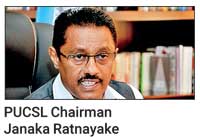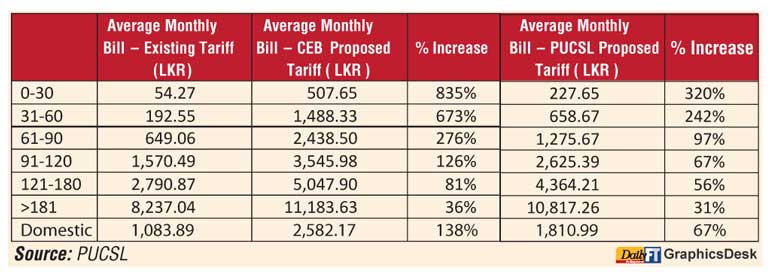Tuesday Feb 17, 2026
Tuesday Feb 17, 2026
Tuesday, 28 June 2022 01:53 - - {{hitsCtrl.values.hits}}
By Charumini de Silva
Electricity regulator, Public Utilities Commission (PUCSL) Chairman Janaka Ratnayake yesterday affirmed despite the Ceylon Electricity Board seeking approval for 82% tariff hike, the Commission is of the view that it should not exceed 57% as relief to users.
Tariff revision for 2022 is being proposed as per Section 30 of the Sri Lanka Electricity Act No. 20 of 2009.
As per the CEB’s tariff revision proposal, it targets to increase the average price of a unit of electricity by 82% from Rs. 18.14 to Rs. 32.48.
“The CEB is targeting annual revenue of Rs. 512 billion through the tariff revision. However, the PUCSL recommends that the price of an average unit of electricity should not exceed Rs. 28.14. We also recommend that the CEB should reduce their operating costs by 10% by increasing its efficiency and use that savings to encourage and absorb more renewable energy into the system,” Ratnayake told the journalists yesterday.
He also said that 3.14 million households use less than 60 units monthly, which accounts for about 50% of the total electricity users.
Against this backdrop, the PUCSL Chief has recommended the Government provide a subsidy of Rs. 65 billion to the aforementioned category.

As per the CEB proposal, the average monthly electricity bill for below 30-units users will be increased to Rs. 507, whilst the average monthly bill for those who use over 30 units and below 60-units, will increase to Rs. 1,488.
However, as per the subsidy proposed by the PUCSL, instead of such a tariff increase, the average monthly electricity bill for users below 30-units can be maintained at Rs. 227, whilst the average monthly electricity bill for those who use over 30-units and below 60-units can be maintained at Rs. 658.
The Commission pointed out that although a 138% tariff increase has been proposed for the entire domestic sector, it should not exceed 67%.
The CEB has also proposed to increase electricity tariffs by 45% for general purpose consumers, 61% for industrial consumers, 43% for hotels, 43% for Government agencies and 189% for places of worship.
In addition, the PUCSL has observed that the conditions imposed by the CEB with the revision of tariffs in 2014 have not yet been fulfilled.
These conditions include; 1) implementation of proper agreements to generate and supply electricity from power plants owned by the CEB, 2)implementation of proper agreement method for electricity transactions between the Transmission and Distribution Divisions (between licensees) of the CEB, 3) introduction of a proper system for keeping separate accounts for the financial activities of the various divisions in the CEB (Generation, Transmission and Distribution) and determining the subsidy requirements and 4) introduction of an independent audit system for the process of purchasing electricity.
Rathnayake highlighted that due to the non-implementation of the aforementioned steps recommended eight years ago, the cost and efficiency of the CEB could not be properly identified.
The PUCSL has also requested the CEB to accept electricity bills in dollars from the companies that earn over 60% of their monthly income in foreign exchange.
He said the guidelines on the payment methodology will be communicated in due course, after discussing with the Finance Ministry and the Central Bank.
He also said that the information regarding the proposed tariff revision (Public Consultation Document) has been published on the official website www.pucsl.gov.lk
The Commission requests all parties, including the public, to submit their views and proposals regarding the proposed tariff revision. Written comments can be submitted by email or fax till 18 July 2022 and details of the date and venue for the oral public consultation session will be announced in due course. The oral session will also be facilitated online.